Nancy’s Note: In July Michelle Laurie and I ran another graphic facilitation workshop in beautiful Rossland, BC, Canada. In summer mode, I still haven’t written up my reflections. When I saw Sylvia Currie’s great post on her blog, I begged her to let me reblog it as a guest post (only the second in FullCirc history!) here. So THANKS Sylvia! I will follow up with my reflections and pointers to more of Sylvia’s great workshop videos. Sylvia came to the RosViz 10 and returned this year as our social reporter. FABULOUS!!!
Reflections on a fantastic workshop
What happened at the 2011 RosViz Graphic Facilitation Workshop? I’m not sure where to begin! It was 2 1/2 days of pure fun, intense learning, lively networking, and the occasional emotional tug. I created this little video in an attempt to capture the experience, which of course will be most meaningful to the participants but hopefully will also give others a glimpse of what the workshop is all about.
Following the introductory evening session and graphic jam we launched right into some activities aimed to, in Nancy’s words, “L O O O O S E N up”, create the unexpected, and most importantly, raise questions in our minds about how this all feels. I mean, how often have you started a drawing with a sopping wet tea bag? Comments after viewing our gallery: I would have never created this if you had just given me a blank piece of paper and markers.
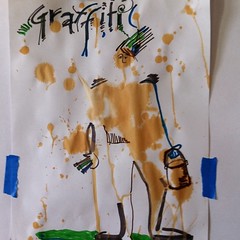 |
| Tea Bag Drawing Exercise |
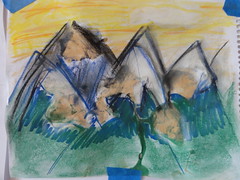 |
| Tea Bag Drawing Exercise |
Giving a starting point, a tea bag splotch, we started to see potential — familiar images formed in our minds from the shapes we saw in front of us. It was a very quick exercise, and aside from some drippy canvases we were ready for a gallery walkabout within minutes.
The same principles were applied in another exercise which can best be described as musical chairs but without the chairs, and with markers and chalk. As soon as the music stops markers are lifted and on you move to the next canvas.
By the time we were finished rotating through each station we had a collection of stunning art that, in most cases, was quite different from what the original artist envisioned. Questions continued to emerge through participation: What did it feel like to draw on someone else’s work?
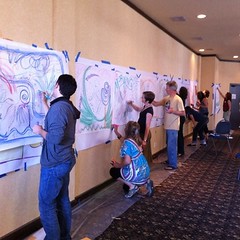 |
| Musical Drawing |
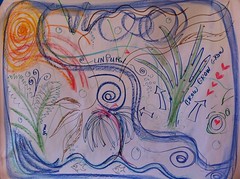 |
| Musical Drawing |
In keeping with Nancy’s approach to just dive right in, more challenging activities were interspersed throughout the workshop. Sure she was careful to lay a bit of foundation, but rather than gradually build up to the big crescendo (live graphic recording without any clues about the topic), these experiences felt more like check points. Wow, that was way more difficult than I thought it would be! And neat, look what I created in just 6 minutes! What really stood out after several practice sessions, debriefs, and plenty of opportunities to network (the power of the snack table!) was the comfort level in the room. We had evolved into quite the uninhibited group!
Looking back on the graphic recordings of Matt Cutts’ Ted Talk: Try Something New for 30 days it’s astonishing to think that these images emerged from a talk that was less that 3 1/2 minutes long. (Violette Clark invites you to participate in her 30-day challenge — a portrait a day for the month of August!)
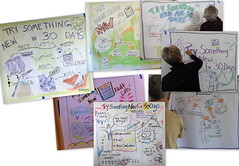 |
| TED Talk Graphic Scribes |
There were some surprises as well. For one of the graphic recording exercises Violette Clark told her story and for all workshop participants this proved to be the most difficult exercise. I wanted to honour Violette and her amazing story, and I was afraid that I wasn’t doing it justice in my drawing.
During the debrief, Violette talked about how overwhelming it was to see her life story represented in all the the incredible drawings around the room. Through this exercise we all experienced how emotional this visual practice can be; I think most of us were fighting back tears at that point!
Another useful practice session was the icon jam. It’s amazing to me how often I can think of the perfect icon while I’m listening, but the right image just won’t form in my brain. Oh! The recycle symbol would go perfectly in this spot. Then my mind goes blank. Others in the workshop shared this same experience. Nancy led us through a couple icon jams to tap into both sides of our brains. Here are some creations from a “throw out, throw in” activity. Nancy also offers an open invitation to contribute to this icon collection.
We weren’t holding crayons every minute of the workshop. Our circle of chairs brought several debriefing conversations, a “fish bowl” activity, a chat with Susan Stewart from California via Elluminate (recording here) about her experiences using an iPad, and a final reflection on the entire workshop experience.
This sounds like a lot over a 2 1/2 day period, and believe it or not I’ve left out quite a bit! Other reflections on the Graphic Facilitation are continuing to pop up:
Also, the RosViz10 Facebook Group is bubbling, and you’re all welcome to join us. (Advance apology — we can’t seem to flip a switch to make this group public so you’ll need to wait for one of the admins to approve your membership.)
Next, while the experience is fresh in my mind, I plan to write about social reporting. But for now I’d like thank Michelle and Nancy for the opportunity!

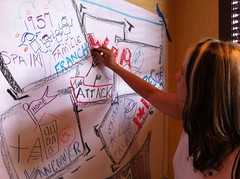
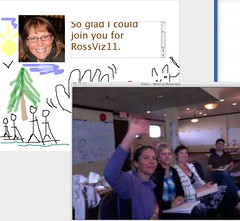
 I need your help and recommendations!
I need your help and recommendations!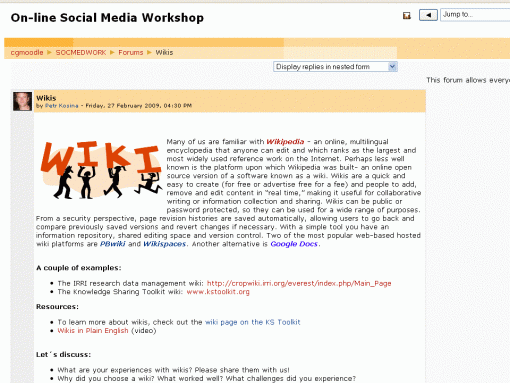
 Beyond doing
Beyond doing  It’s time to register for the
It’s time to register for the